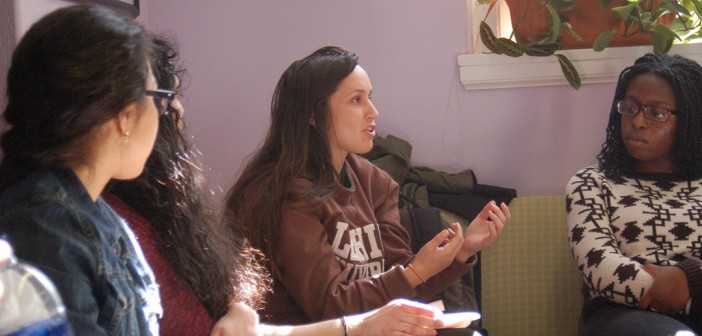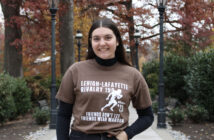Students of various nationalities from Haitian, to Indian and to African American came together to talk about colorism at a discussion hosted by the Women’s Center and Lambda Theta Alpha Latin Sorority Inc.
The goal of this event was to get people talking about colorism, for people to start thinking about it and to have women of color give their thoughts on this issue. Brenda Martinez, ’15, said Lambda Theta Alpha’s goal is to encourage and empower women. She said the sorority was discussing this issue before and decided they wanted people on campus to know about it, as well.
The discussion began with Martinez, one of the facilitators for the discussion, defining colorism. She went on to explain how colorism is unique to communities of color, that people within various communities discriminate against those with darker skin, and how lighter skin is perceived as not only better but also as more beautiful. She said colorism does not only refer to skin color but also to hair type.
Colorism is a bigger issue for women than for men because of the relationship with beauty. This relationship encourages competition because lighter skin is often considered more beautiful. One participant in the discussion mentioned how her sibling is considered more beautiful just because she has lighter skin.
It was also discussed that women are sometimes more sensitive to the remarks and connotations of being darker skinned. Women can spend hours on makeup and clothes and eyebrows yet it is their skin color, something they cannot change, that impacts them.
When discussing that women in one country bleach their skin to try and become lighter, someone in attendance said, “once you bleach your skin you are neither light nor dark. You are not natural, you are your own thing.”
Clara Buie, the assistant director of English as a second language at Lehigh, said colorism is prevalent in families and that she has seen students at Lehigh be affected by colorism.
“We need to come together and not discriminate within our minority groups,” Martinez said.
She said the issue of colorism is on Lehigh’s campus, although it’s not as prominent as it is within communities of color. Martinez said she couldn’t think of a specific example of experiencing colorism while at Lehigh.
“I’m lucky because I’m Hispanic,” said Kristen Mejia, ’17, on whether she has experience discrimination at Lehigh. “They think of Gloria on Modern Family when they think of Hispanic, that stereotype…. I’m lucky that I’m on the spectrum (of color).”
Mejia also went on to explain that women are more affected in terms of colorism because they are more valued in terms of looks.
Lambda Theta Alpha hopes to have more of these discussions to help begin to get rid of the issue of colorism. The sorority plans to host a movie showing to continue this discussion.






Comment policy
Comments posted to The Brown and White website are reviewed by a moderator before being approved. Incendiary speech or harassing language, including comments targeted at individuals, may be deemed unacceptable and not published. Spam and other soliciting will also be declined.
The Brown and White also reserves the right to not publish entirely anonymous comments.